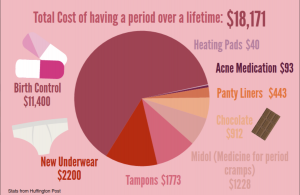The Price of Pink
By Emma Andersson, WEN Guest Blogger

For those that experience a period, imagine that you’re shopping for menstrual products and find yourself before an expansive selection, overwhelmed by the numerous options and confused by the marketing verbiage: plant-derived; BPA free; hypoallergenic. For many, myself included, this situation feels familiar. On top of brand and style, I find myself evaluating whether to splurge for toxin-free materials that are better for my body, to seek out ethically-sourced products or to opt for reusable products that best serve the needs of our planet.
Internally, I debate the pros and cons of each until, finally, I exhaust myself and give up, heading over to the cashier with my final choice — only to encounter an appalling price for that single item. Although the former narrative rings true for many, the latter tale resonates with even more. Owing in large part to their cost, 500 million out of an estimated 800 million menstruating individuals lack adequate sanitary resources on any given day. While the socioeconomically privileged face the challenge of discerning the most sustainable, ethical products, more individuals struggle to purchase any at all.
Many have heard the story of Indian women constructing their own pads, but this “period poverty” also plagues our own communities here in the United States. Often exceeding ten dollars for a multi-pack, those who menstruate can expect to spend close to $2,000 for tampons and pads over a lifetime. However, these estimates fail to incorporate the cost of laundry, ruined underwear, health complications, painkillers and other affiliated expenditures, suggesting that the actual cost of menstruation reaches far higher. Additional sales taxes on menstrual products in 27 states exacerbate the cost of these health essentials, further digging into the pockets of women.
As if women did not already experience economic disadvantages via the wage gap and unpaid domestic work, society imposes the cost of menstrual products and their accompanying taxes. Whereas men are exempt from these expenses, we must pay up in order to continue to work and engage with others whilst undergoing menstruation, a biologically-determined phenomenon.
While more state legislatures are working to remove the sales tax on menstrual products, Michigan being the most recent state to do so, our women need more. Menstrual products do not only distribute an unequal financial burden on women, that burden generates inequitable access that creates negative health outcomes in marginalized groups, most frequently the poor and the incarcerated.
The government, even as it raises revenue via the “pink tax” in certain states, enacts policies that deepen the inequality of access to menstrual products. For example, in publicly funded schools and shelters, approved budgetary expenditures do not include tampons and taxes, spelling trouble for those facing housing instability. Likewise, those receiving financial support from some public health benefits programs, including the Supplemental Nutrition Assistance Program (SNAP), cannot use the money to purchase menstrual products.
Similarly, corrections facilities do not provide inmates with complete access to menstrual products, forcing them to beg and bargain with staff in a dangerous and degrading manner. And even in other work settings, including offices and hospitals, employers grant too few or too short bathroom breaks, restricting a woman’s opportunity to safely address her sanitary needs and putting her at risk for other conditions.
In all cases, the lack of access to menstrual products corresponds to detrimental behaviors that harm a woman’s health. For example, individuals without adequate resources resort to using sanitary products improperly or improvising with other materials, risking infections that can harm pregnancy or render them more susceptible to sexually transmitted diseases. Using tampons for too long endangers the onset of Toxic Shock Syndrome (TSS), a condition with the potential to threaten a hysterectomy or, in extreme cases, fatality. Evidently, inadequate access to resources directly impacts the health of women, right here in the United States.
While the tampon tax presents the privileged with an annoyance, it generates unequal access that incites negative health outcomes in marginalized groups. Though the privileged nevertheless hold a responsibility to make ethical consumer decisions, perhaps it is time to prioritize equitable access for all. Equity precedes advancement, even in environmental efforts, with reproductive health reflecting only one aspect.
Abolishing the tampon tax displays a step towards equity, but our women deserve more. And our communities and our planet, both reliant on women, deserve more. The challenges of the twenty-first century demand resilience, the cultivation of which strong women support. Supporting a healthy female population exemplifies one means of fostering resilience, and so I call on the government to take action towards equity and provide free menstrual products for all. It is time to do more for our women, our communities and our planet.
Bio: Emma Andersson is a current undergraduate student at the Johns Hopkins University Krieger School of Arts and Sciences pursuing a dual International Studies-Sociology degree. A passionate learner, lover of nature, and an advocate for women’s rights, Emma is deeply interested in the intersection of women’s and environmental health.
